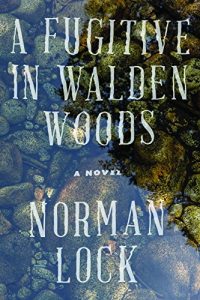A Fugitive in Walden Woods manages that special magic of making Thoreau’s time in Walden Woods seem fresh and surprising and necessary right now. Norman Lock tells the story of Samuel Long, an escaped slave who encounters Thoreau, with insight and some welcome humor. This is a patient and perceptive novel, a pleasure to read even as it grapples with issues that affect the United States to this day.” Victor LaValle, author of The Ballad of Black Tom and The Changeling
Portraying the traumatic psychological aftershock not of war but of slavery provides a convincing and complex narrative of new hardships faced by escaped slave Samuel Long in Norman Lock’s bold and enlightening novel A Fugitive in Walden Woods. It’s an important novel that creates a vivid social context for the masterpieces of such writers as Thoreau, Emerson, and Hawthorne and also offers valuable insights about our current conscious and unconscious racism.” Sena Jeter Naslund, author of Ahab’s Wife and The Fountain of St. James Court; or, Portrait of the Artist as an Old Woman
Samuel Long escapes slavery in Virginia, traveling the Underground Railroad to Walden Woods where he encounters Henry David Thoreau, Ralph Waldo Emerson, Nathaniel Hawthorne, William Lloyd Garrison, and other transcendentalists and abolitionists. While Long will experience his coming-of-age at Walden Pond, his hosts will receive a lesson in human dignity, culminating in a climactic act of civil disobedience.
Against this historical backdrop, Norman Lock’s powerful narrative examines issues that continue to divide the United States: racism, privilege, and what it means to be free in America.
Norman Lock is the author of, most recently, the short story collection Love Among the Particles, and three previous books in The American Novels series: The Boy in His Winter, a reenvisioning of Mark Twain’s classic The Adventures of Huckleberry Finn, American Meteor, an homage to Walt Whitman and William Henry Jackson, and The Port-Wine Stain, an homage to Edgar Allan Poe and Thomas Dent Mütter. He lives in Aberdeen, New Jersey, where he is at work on the next books of The American Novels series.
Portraying the traumatic psychological aftershock not of war but of slavery provides a convincing and complex narrative of new hardships faced by escaped slave Samuel Long in Norman Lock’s bold and enlightening novel A Fugitive in Walden Woods. It’s an important novel that creates a vivid social context for the masterpieces of such writers as Thoreau, Emerson, and Hawthorne and also offers valuable insights about our current conscious and unconscious racism.” Sena Jeter Naslund, author of Ahab’s Wife and The Fountain of St. James Court; or, Portrait of the Artist as an Old Woman
Samuel Long escapes slavery in Virginia, traveling the Underground Railroad to Walden Woods where he encounters Henry David Thoreau, Ralph Waldo Emerson, Nathaniel Hawthorne, William Lloyd Garrison, and other transcendentalists and abolitionists. While Long will experience his coming-of-age at Walden Pond, his hosts will receive a lesson in human dignity, culminating in a climactic act of civil disobedience.
Against this historical backdrop, Norman Lock’s powerful narrative examines issues that continue to divide the United States: racism, privilege, and what it means to be free in America.
Norman Lock is the author of, most recently, the short story collection Love Among the Particles, and three previous books in The American Novels series: The Boy in His Winter, a reenvisioning of Mark Twain’s classic The Adventures of Huckleberry Finn, American Meteor, an homage to Walt Whitman and William Henry Jackson, and The Port-Wine Stain, an homage to Edgar Allan Poe and Thomas Dent Mütter. He lives in Aberdeen, New Jersey, where he is at work on the next books of The American Novels series.












